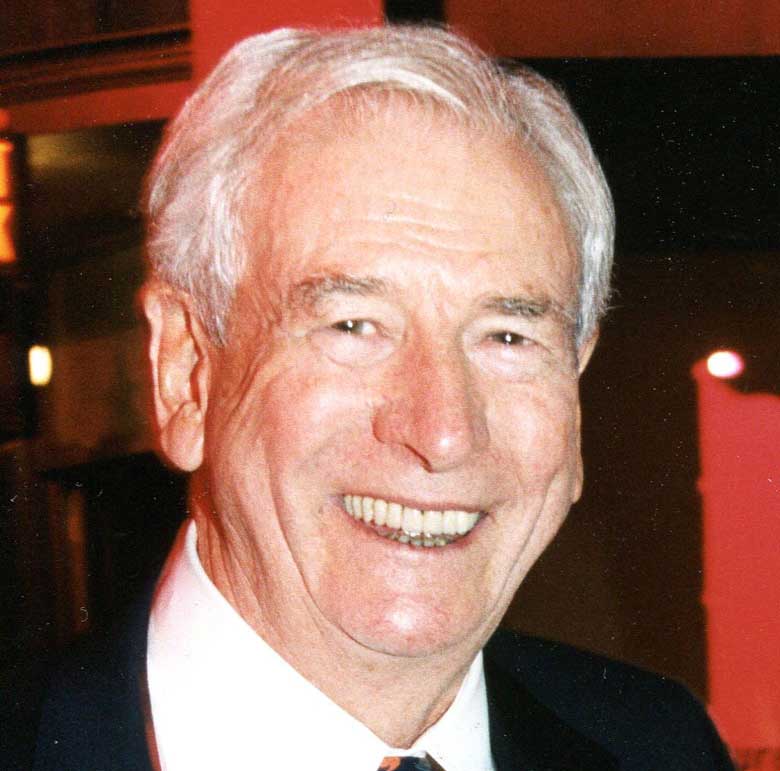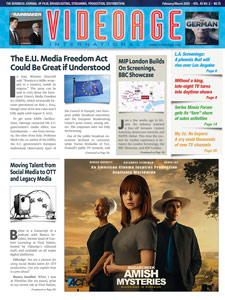Bruce Gordon started his successful career in the international program distribution business in 1962, but to describe him, it is better to begin with the present. That said, this one page couldn’t do justice to his accomplishments, which would require an entire book to outline.
Gordon doesn’t believe in titles, so he’s content being deputy chairman of WIN, an entertainment group based in Wollongong, Australia, which owns a TV network, radio stations, a production company, a rugby team and investments in several TV outlets. The executive chairman is his firstborn, 44-year-old Andrew, and his daughter Genevieve, 24, is a board member.
Gordon became a broadcaster by chance. In the mid-1960s he began to buy shares of Sydney’s TV Channel Ten as a family investment. When, in 1979, Rupert Murdoch decided to take control of the channel, he met Gordon for lunch in New York City and traded his majority shares in TV station WIN-4 in Wollongong for the Gordon family’s shares of Channel Ten.
Gordon accepted that offer immediately, unlike in 1958 when he declined a job offer to run Murdoch’s TV station in Adelaide.
The seaside resort town of Wollongong has been Gordon’s home base ever since, and it now boasts The Bruce Gordon Theater, which was inaugurated in 1988 by Prince Charles and Princess Diana. His links to both the town and the arts go back to his childhood. He recalls summer holidays and when he performed his magic act at the old Town Hall Annex in Wollongong, a town south of his birthplace, Sydney.
Today, at age 86, Gordon is a bundle of energy trying to prevent the joint Discovery-Foxtel A$590 million bid to buy the Ten TV network, where he owns a 14.9 percent stake, pitting him against shareholders Lachlan Murdoch and James Packer. Subsequently, Foxtel bought a 15 percent stake in Ten for A$77 million.
Recently, Gordon acquired for A$40 million a five percent share in Network Nine in anticipation of media reforms that could trigger a series of takeovers. He also owns 2.02 percent of TPG, which is in the midst of a A$1.4 billion takeover of iiNet to create Australia’s second-largest broadband provider.
Gordon’s life has been bound inextricably to the theater and media. He first rose through the ranks of the Tivoli Theatre chain in Australia before eventually becoming business director and a member of the chain’s management board in 1960. Then, in 1962, the American Desilu Studios (of I Love Lucy fame) asked him to run its Sydney office, heading sales of Desilu programs in Australia and Asia. In 1967, Desilu was bought by Paramount for $10 million, and Gordon became the studio’s managing director for the Far East. In 1972, he was promoted to VP of International TV Sales and in 1974 was named president of Paramount International Television and moved to New York City to work under the company’s owner Charles Bluhdorn and Paramount’s chairman Barry Diller.
In a recent interview with VideoAge, Gordon recalled the early challenges when he had to integrate the Desilu international sales structure into Paramount, which did not have an extensive overseas TV program sales unit. Indeed, Gordon’s first TV market was MIP-TV in 1966 with Desilu. “In the beginning we had a very small stand, but when Columbia gave up its booth, we quickly took that larger space in the Old Palais. After that, all our stands became thematic, reflecting the key series that we were launching internationally,” he said.
He also recalled just before the sale to Paramount, Desilu had three series in production: Star Trek, Mission Impossible and Mannix. Those series subsequently became big franchises for Paramount.
In 1985, two years before Paramount’s international TV division moved to Hollywood, Gordon relocated to Bermuda, where he currently resides (in addition to having homes in Wollongong, London and Monte Carlo).
Gordon is indeed a world traveler. When in the distribution business, he was often on the road for four or five months each year. He once summarized his business philosophy this way: “A guy at a station in Japan doesn’t send you a postcard and say, ‘I’ll buy MacGyver’. You’ve got to get on a plane and go to Japan and see your clients and then make your deal. I live in a suitcase. I don’t spend a lot of time anywhere,” he said, explaining that, as a result, he doesn’t have many close friends. He also tends to have little tolerance for his managers, especially, he says, those who like to reinvent the wheel (not trusting that he has seen all and dealt with all possible unexpected challenges).
While at Paramount, Gordon worked with a who’s who of the U.S. entertainment industry, including Michael Eisner, Rich Frank, Frank Mancuso, Martin Davis, Sumner Redstone, Kerry McCluggage, Jonathan Dolgen and Lucie Salhany. Despite many ownership and management changes, he survived by perfectly timing his foreign sales visits and therefore was never caught taking sides in the middle of corporate in-fights. He was also valued for his ability to fulfill management requests of quarterly sales increases.
When Gordon became president, Paramount’s international TV annual sales were $8 million. They were $500 million when he retired in 1997. At the time, all the MPAA members combined generated $2.6 billion internationally.
During Gordon’s time in New York, he was able to expand and diversify Paramount’s operations into production, co-production and acquisition, arranging co-productions between Paramount and the Nine Network Australia, including the Spyforce and Mission Impossible series.
Despite all his movement, Gordon has not forgotten his roots. “I never stop thinking of myself as Australian,” he told Sydney’s Sun Herald in 1990. “I went overseas to work for the Americans and I took Australian programming over there and sold it to the Americans, and I have done everything I could to help the local industry here.”
There are a number of legends about this man. One such legend centers around his various nicknames. Internationally, he was known as the “General,” but in Australia they call him “God.”
Gordon acknowledged the “General” tag, explaining that after seeing him followed by a group of kids in Bali, a Fox executive kept hailing “General Gordon and his troops.” However, Gordon is surprised to be called “God.” “Most likely, it’s ‘bloody God,’” he said.
Then there are others. the late Bruce Gyngell, one of Australia’s top TV executives, once recalled: “In the early ’60s, Bruce got a 22-foot yacht that he named Desilu. The problem was that he’d never sailed before in his life. After reading every book he could get his hands on about sailing, Bruce and Desilu won the Pittwater competition the following season.”
Nowadays, when in Bermuda, Gordon gets around on a motor scooter that he likes to service and repair himself.
He doesn’t like to brag about his good fortune. On the contrary, he likes to keep quiet so as not to stimulate unnecessary jealousy and envy. He’d rather talk about his humble origins and how television fulfilled his dreams.
Gordon is Australia’s 34th richest person with an estimated fortune of A$1.1 billion, and he owns Australia’s largest TV network by area, which he once described as being larger than Europe even though it serves only 5.2 million people.
Gordon’s financial fortune began when, after acquiring majority ownership of WIN, he took the public-owned station private by buying out the other shareholders.
Then, in 1989, he purchased Crawford Productions and in 1991, two TV stations in Queensland, followed by TV stations in Victoria, Tasmania, South and West Australia to complete the WIN network. His cash came from smart acquisitions and timely sales, like in 2007 when he purchased a TV station in Perth for A$163 million, and another in Adelaide for $105 million and sold them both to the Nine Network in 2013 for $400 million.
by Dom Serafini
Comprehensive stories about Bruce Gordon were published in the October 1997 Issue of VideoAge (a salute to his retirement from Paramount) and in the October 2009 Issue of VideoAge (for WIN’s 30th anniversary).
Audio Version (a DV Works service)












[…] Image from http://www.videoageinternational.net/2015/09/23/hall-of-fame/bruce-gordon-sales-gave-the-savvy-to-co… […]
what a guy, should do a life story, or maybe a film.
from a relation in a round about way